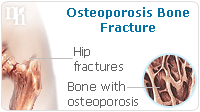
As women age they become more susceptible to bone fractures and osteoporosis. This is especially common post menopause when women generally suffer from low levels of estrogen hormones which decrease bone density and weaken bones. It is commonly known that regular calcium intake in the form of milk and other diary products helps to keep bones healthy throughout life and now doctors are suggesting increased calcium intake on a population base levels in order to try and reduce the risk of osteoporosis developing as people age. As osteoporosis is particularly common in postmenopausal women, this group is ideal to try and test if this theory is effective in people who have weaker bones do to wavering levels of hormones.
In a five-year placebo-controlled trail, the effect of long-term increased calcium consumption was assessed in relation to the likelihood of women developing osteoporosis, post menopause. A group of 1460 women were selected, all of which were over 70 and in post menopause. These patients were randomly selected to receive either calcium carbonate, 600 mg twice per day, or identical placebo. Over the five year follow up of this trail, osteoporotic fractures, vertebral deformity, and adverse incidents were recorded. Bone structure was measured using x-ray's of the hip and whole body, quantitative ultrasonography of the heel and analysis of the distal radius.

The results of this study showed that 16.1% of the women who took part suffered some time of fracture during the follow up. 830 subjects were took at least 80% of their assigned supplements of calcium showed a reduced risk of osteoporosis related fractures. A side effect of this trail was increase incidents of constipation suffered by the women involved. After fracture, many of the women were given calcium supplements as a treatment to help heal their fractures. Researchers noted no decreased risk of further bone fractures due to this treatment.
As these results show, increased calcium intake can help to reduce the risk of fractures caused by wavering hormones, post menopause. Women should consult their doctors in order to establish the correct calcium supplement for them and to make sure that increased calcium consumption would not interfere with other medication a woman may be taking as her body comes to terms with postmenopausal hormones.